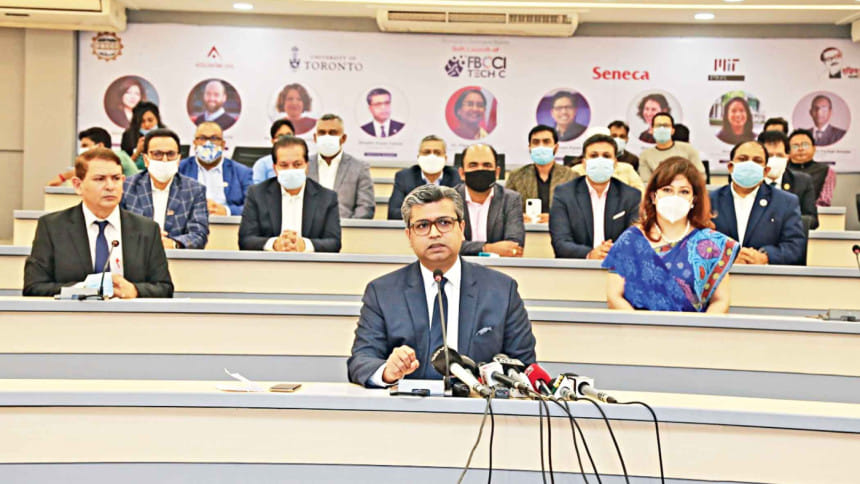FBCCI launches centre to develop technopreneurs

The Federation of Bangladesh Chambers of Commerce and Industry (FBCCI) yesterday launched a technology centre to facilitate the growth of local tech startups and technopreneurs.
The main aim of this initiative is to build a digital ecosystem in the country by creating "Imact Tech-Preneurs" who can solve social problems and have a measurable and transformative impact on the digital landscape.
The centre, dubbed "FBCCI Tech C", is a part of the FBCCI Impact 4.0 (2020) project, which was launched to mark the centennial birth anniversary of Bangabandhu Sheikh Mujibur Rahman.
The country's apex trade body signed agreements with various international organisations such as the Massachusetts Institute of Technology (MIT), University of Toronto, Accelerating Asia and Seneca College to train local startups through this initiative.
The technology centre was inaugurated through a ceremony held at the FBCCI's Icon Tower in Dhaka.
Education Minister Dipu Moni and State Minister for ICT Zunaid Ahmed Palak participated in the ceremony.
FBCCI Tech C is one vertical of FBCCI Impact 4.0 (2020), which was adopted by the current board, according to FBCCI President Sheikh Fazle Fahim.
"The aim is to enable technology adaptation to strengthening business, both small and large firms, by leveraging innovations across economic sectors in Bangladesh to be a part of the global value chain and ecosystem with indigenous synergies," he said.
Bangladesh's future economic success, growth and competitiveness depend on a thriving and innovative technology sector.
"And so, data-driven innovation is now the foundation for businesses across the country," Fahim added.
Echoing him, the education minister said the FBCCI's initiative was aligned with the Digital Bangladesh agenda.
"The ministry has also been preparing to adapt to the fourth industrial revolution. Therefore, it is heartening to see such initiatives that leverage today's concepts of technology, collaboration, globalisation and enable us to thrive," Moni said.
Technology will play an essential role in attaining Vision 2021, Vision 2041 and Bangabandhu's Sonar Bangla, according to State Minister Palak.
Leveraging tech innovations to have a competitive edge will help improve Bangladesh's economic growth but for that the country needs a thriving and innovative technology sector, he said.
Sonia Bashir Kabir, an advisor to the FBCCI, gave a presentation about Tech C at the event.
FBCCI TECH C entails startup preparedness skills, Ag Tech (Agriculture Tech), Digital Financial Service (FinTech), Med Tech (Health Tech), Ed Tech (Education Tech), e-commerce, Rural Broadband Smart Cities and so on.
"It will also work for developing artificial intelligence, ensuring cyber security, creating internet of things (IOT), adaptation of blockchain for the private and public sector, enhancing data analytics & machine learning and applied skills, or tech vocational training," she said.
Kabir went on to say that the centre would help startups graduate from democratising technology to democratising innovation.
Elisabeth Rees-Johnstone, a faculty of the University of Toronto, agreed that Tech C would help create "Impact Tech Preneurs" for the country.
"We're excited to extend the work we do in the ecosystem to more startups with our FBCCI Accelerator, powered by Accelerating Asia," said Amra Naidoo, co-founder of the Singapore-based organisation.
Sharon Bort, senior officer of sustainability at the MIT, said the global challenges for 2021 includes ensuring equitable connectivity to access digital commerce and public services for everyone and protecting all people from health security threats and disease outbreaks.
It also encompasses reimaging classrooms for the next generation of learners, preserving and strengthening ecosystem services, including carbon mitigation and harnessing tech to promote racial justice and the formation of antiracist society, said Bort.

 For all latest news, follow The Daily Star's Google News channel.
For all latest news, follow The Daily Star's Google News channel. 



Comments